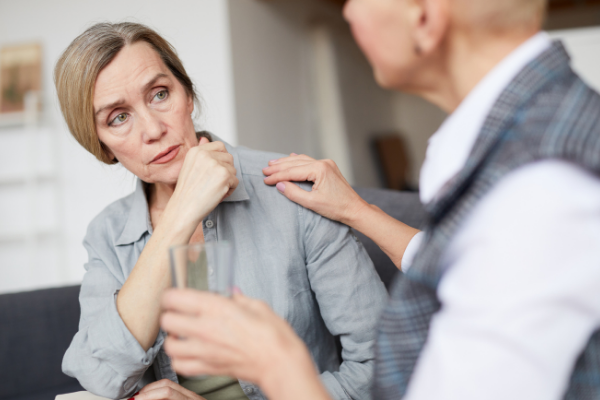Substance abuse triggers can be something, someone, someplace, memories, and physical sensations that interrupt recovery momentarily. Everyone will experience triggers once they have left their former life of addiction behind. The strength of a trigger is what can lead to relapse if it is not dealt with when it occurs. Usually, avoiding people, places, and things that cause triggers can safeguard a person but not always. Knowing what to do when a trigger happens is how people in recovery keep their peace of mind and stay clean and sober.
A trigger is when a person associates the stimuli —including people, places, drug paraphernalia, and even internal states, such as mood—with the substance’s rewarding effects. (NIH)
Are Substance Triggers Physical, Mental, or Emotional?
In reality, triggers can affect all three aspects of a person’s well-being. A physical trigger is when someone smells a drug or alcohol nearby, their heart rate goes up, their hands shake, and they feel uncomfortable. A mental or emotional trigger is far more complex. To be triggered in these capacities equates definitively to why addicts and alcoholics use substances. Drugs and alcohol are what people use to self-medicate from mental and emotional turmoil. Shame about the past, worry, and fear about the future and present symptoms of anxiety or depression represent the reasons for substance abuse. If a person is emotionally and mentally stable, a trigger will be less likely or not affect them as strongly.
What Situations Cause Drug Abuse Triggers?
Triggers are personal. One person may not be affected by seeing someone else they used to get high with at the grocery store, while another may ask them for drugs. Regardless some scenarios are well known to incite a desire to return to drugs and alcohol and can be referred to as ‘triggering.’ They include:
- Beginning a new romantic relationship
- Breaking up with a boyfriend or girlfriend
- Losing a job or not getting the job they wanted
- Going to court for charges related to drugs and alcohol
- Arguments with family or friends
- Traveling on Airplanes where alcohol is readily available in airports
- Holiday events around people NOT in recovery who drink or use
- Funerals or end of life services where alcohol is served
Can a Person Relapse Even if They Are Not Triggered?
Yes, a person can relapse on any -type- of day. Triggers remind a person profoundly of why they liked using and drinking and can lead to further thoughts about it. Still, many people relapse without any thought about their drug of choice. Relapse happens long before a person picks up drugs or alcohol. Addiction to anything is a disease that centers on the mind. It is about needing to self-medicate to escape their mind and emotions. The stress and mental pain addicts and alcoholics feel also began for them long before discovering relief in substances. Therefore, if a person does everything to support their recovery, they will experience fewer triggers. Recovery is not easy to do, but it is how to attain peace of mind and like life without substances.
How Do Addiction Professionals Describe a Trigger?
The National Institutes of Health researchers provide evidence-based insight on addiction and triggers. They explain why triggers are related to external stimuli and internal stress and discomfort.
Usually, the emphasis is on avoiding trigger stimuli through healthy habits, but subjective elements are related to the complexity of personal relationships and self-assessment. Relapse is the effect of not having coping strategies. Moreover, the high percentages of drug-addicted patients allege intrapersonal determinants related to frustration as the main cause of relapse.
Are There Signs When Someone is Likely to Relapse?
Signs of relapse appear in the individual’s attitude and behaviors. First, people in recovery know how to work their recovery program daily. Then there are accepted guidelines among people in recovery on how not to react or engage the mind, leading to anxiety, depression, or obsession. The signs of someone who is about to relapse will start to resemble their old character while on drugs and alcohol. For example, they may stop going to meetings as often or say they are too tired to make them regularly. Another indication of relapse is not taking prescribed medications or overtaking their medications. Other red flags include:
- Not being honest
- Sleeping more or less
- Seeing old drug or drinking friends or talking about them often
- Expressing that they feel cured of their addiction
- Resistant to counseling, meetings, or help of any kind
Is There a Program For Avoiding a Relapse?
Evoke Wellness in Coconut Creek provides relapse prevention and programs that target people who have relapsed recently but attained months or years of clean time. When someone relapses after a time in recovery, they will not forget how to be clean and sober. In one sense, they are better prepared to re-enter recovery. Yet, what is sad about relapse is that many people will fall much harder and consume far more substances than before. The danger of accidental overdose is also prominent. Then some never return and end up in prison or dying because of the drugs and alcohol ruining their health.
Evoke Wellness in Coconut Creek, Florida Has Options For Re-entering Recovery
We have helped people get back their recovery after a relapse. Relapse is a part of recovery, so do not feel alone or like a failure—as everyone usually relapses, and it is rare to meet someone who has not. We support our patients where they are at, and we guide them on how to build up their recovery even better than the first time. Often relapse helps patients see where they were not focused, and then they see how to change to get there with our in-depth therapy and evidence-based counseling tailored to their needs. Call today to be admitted today.


